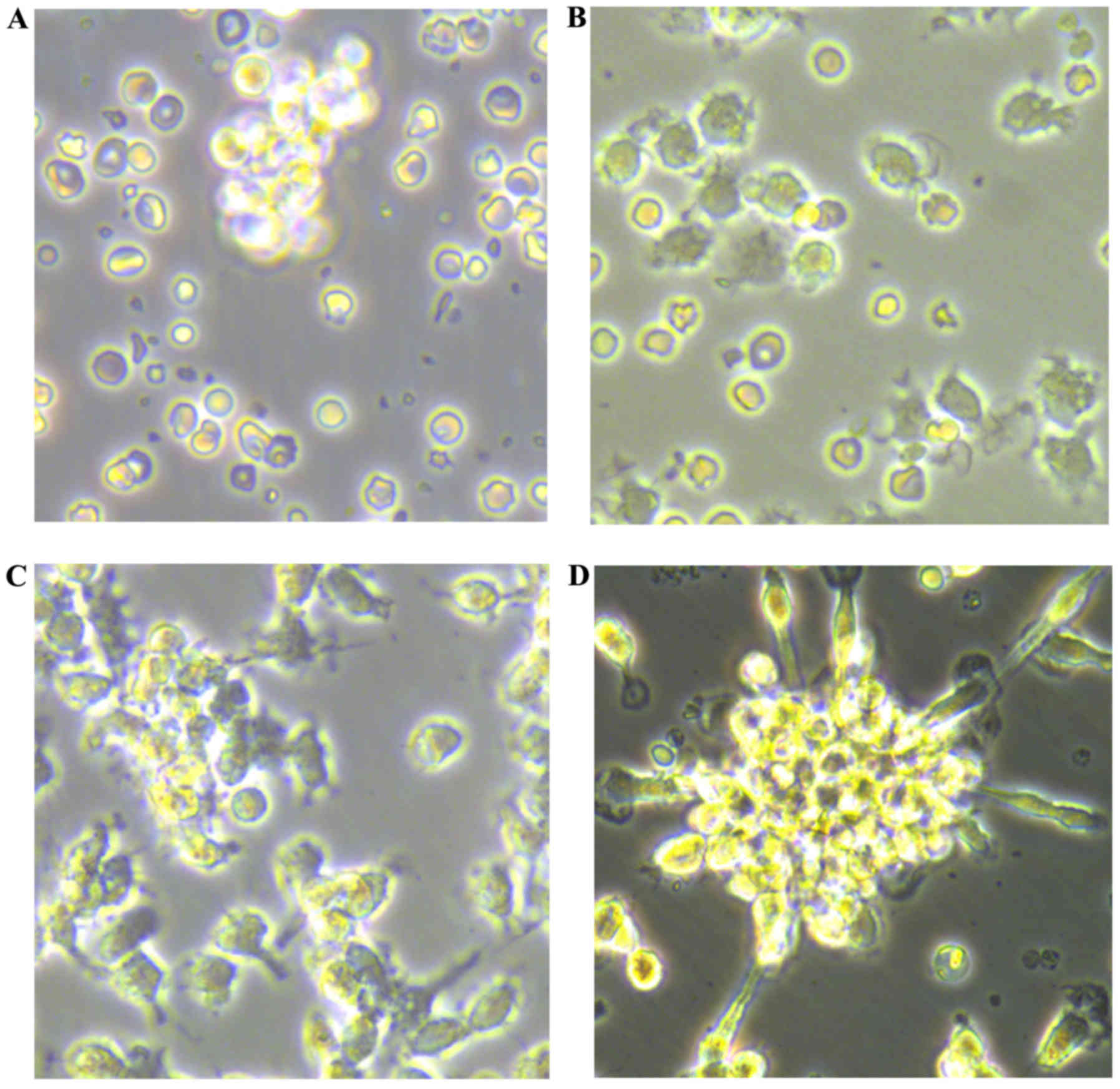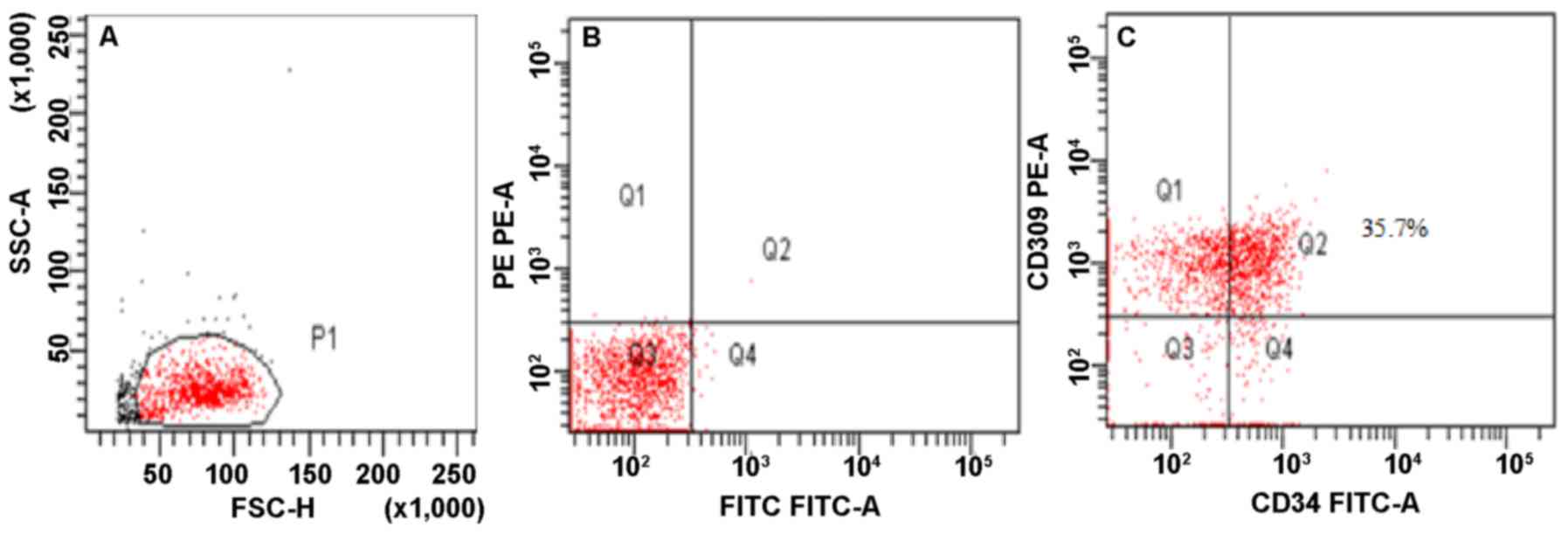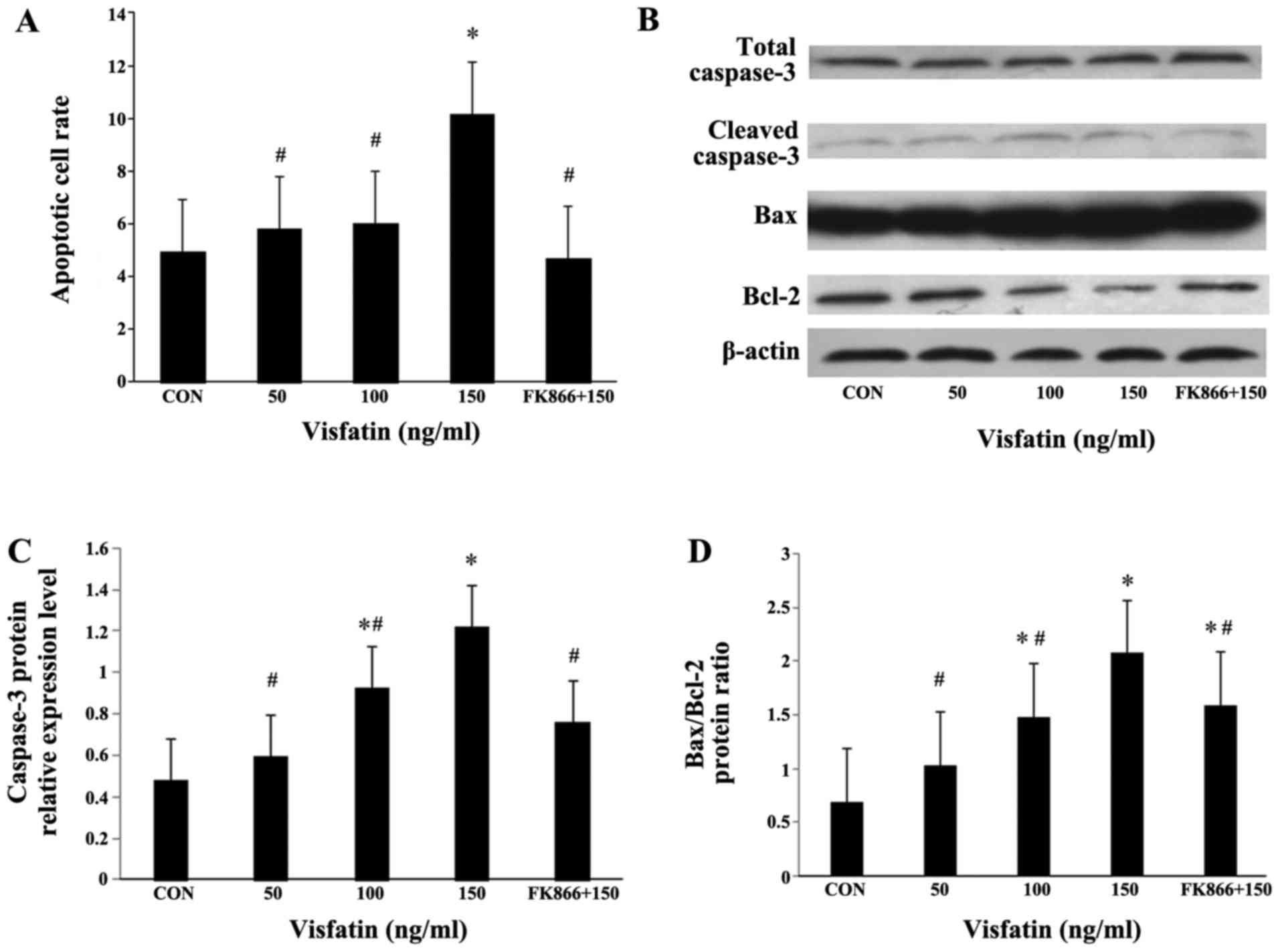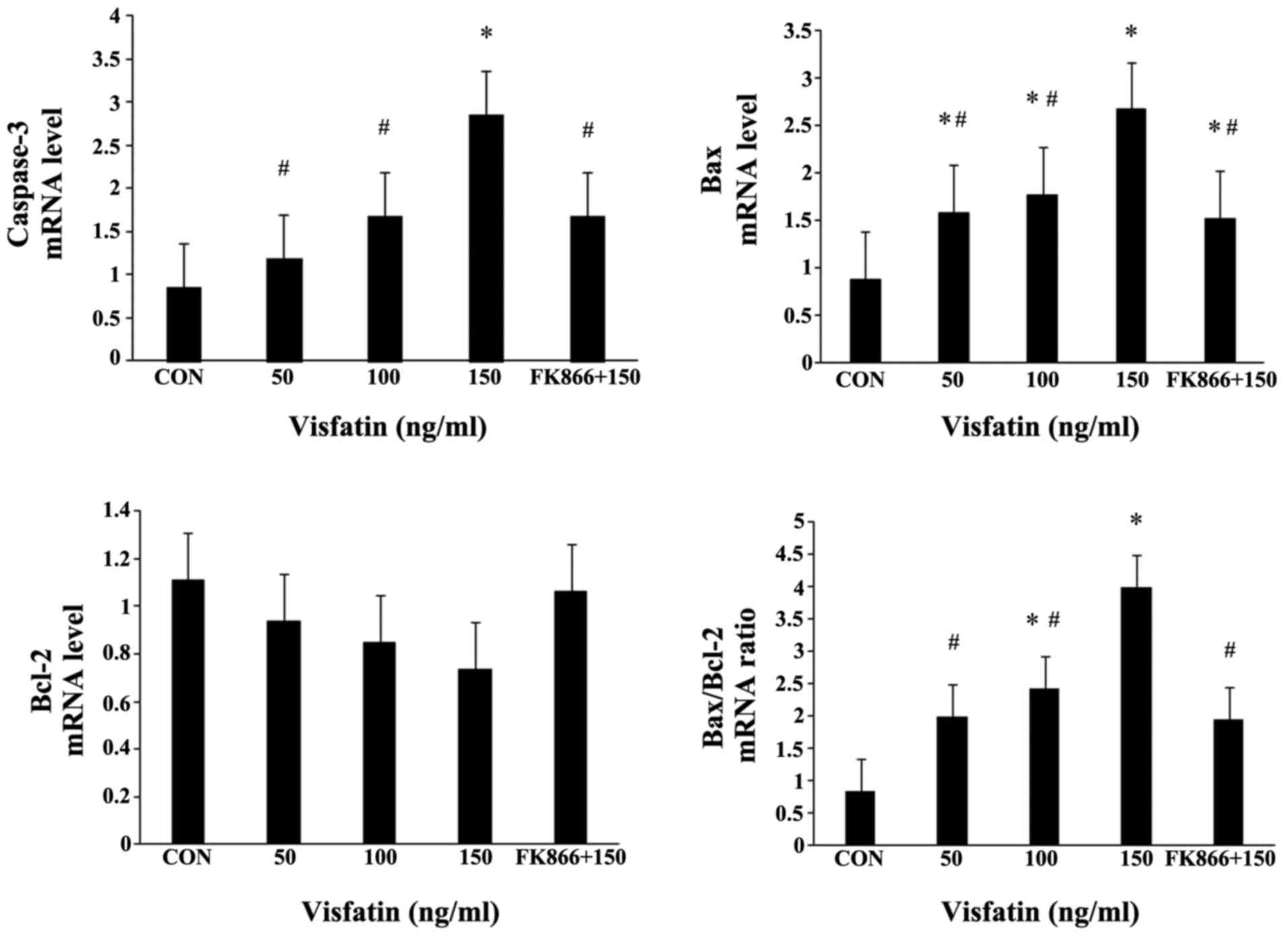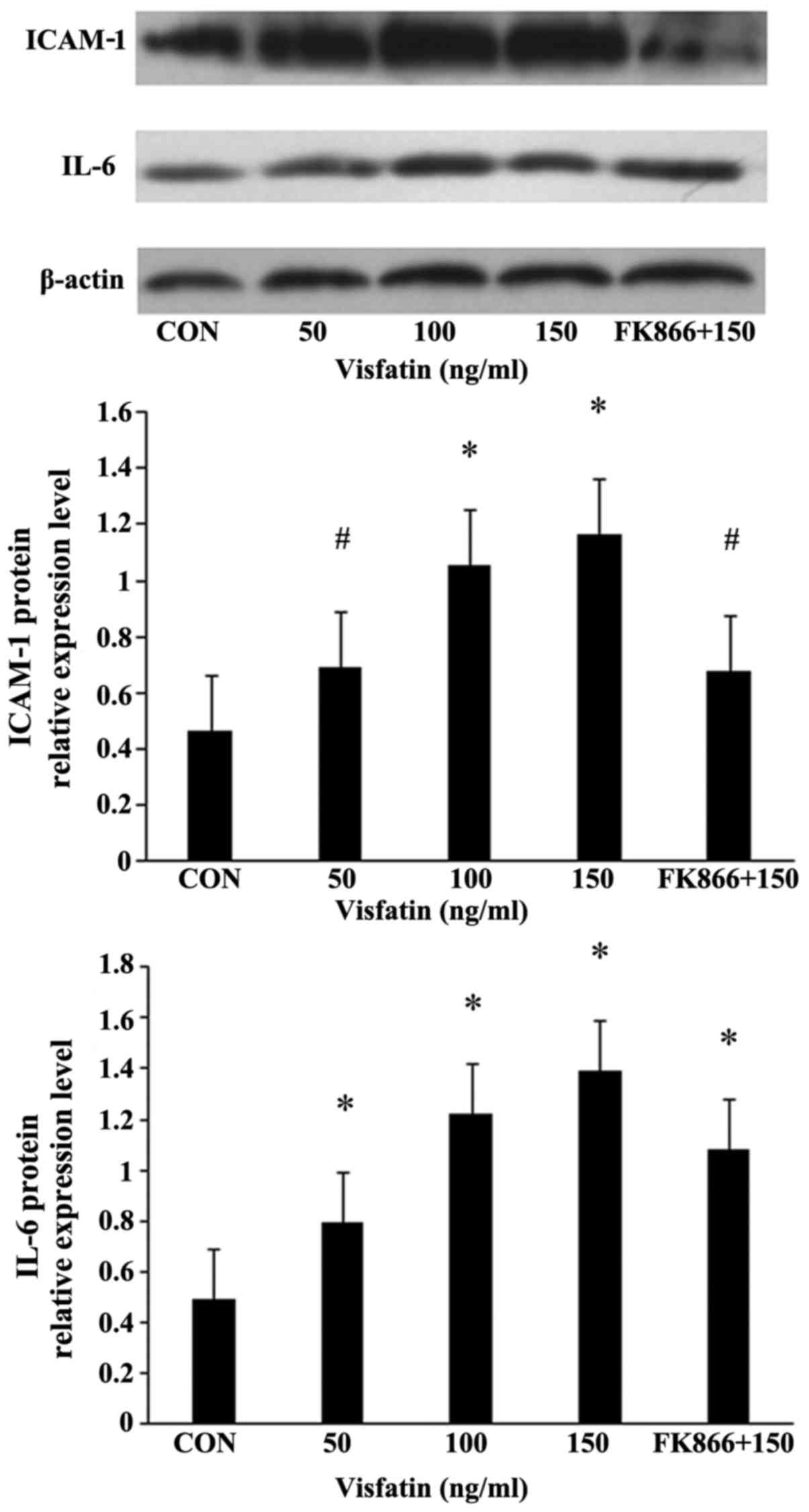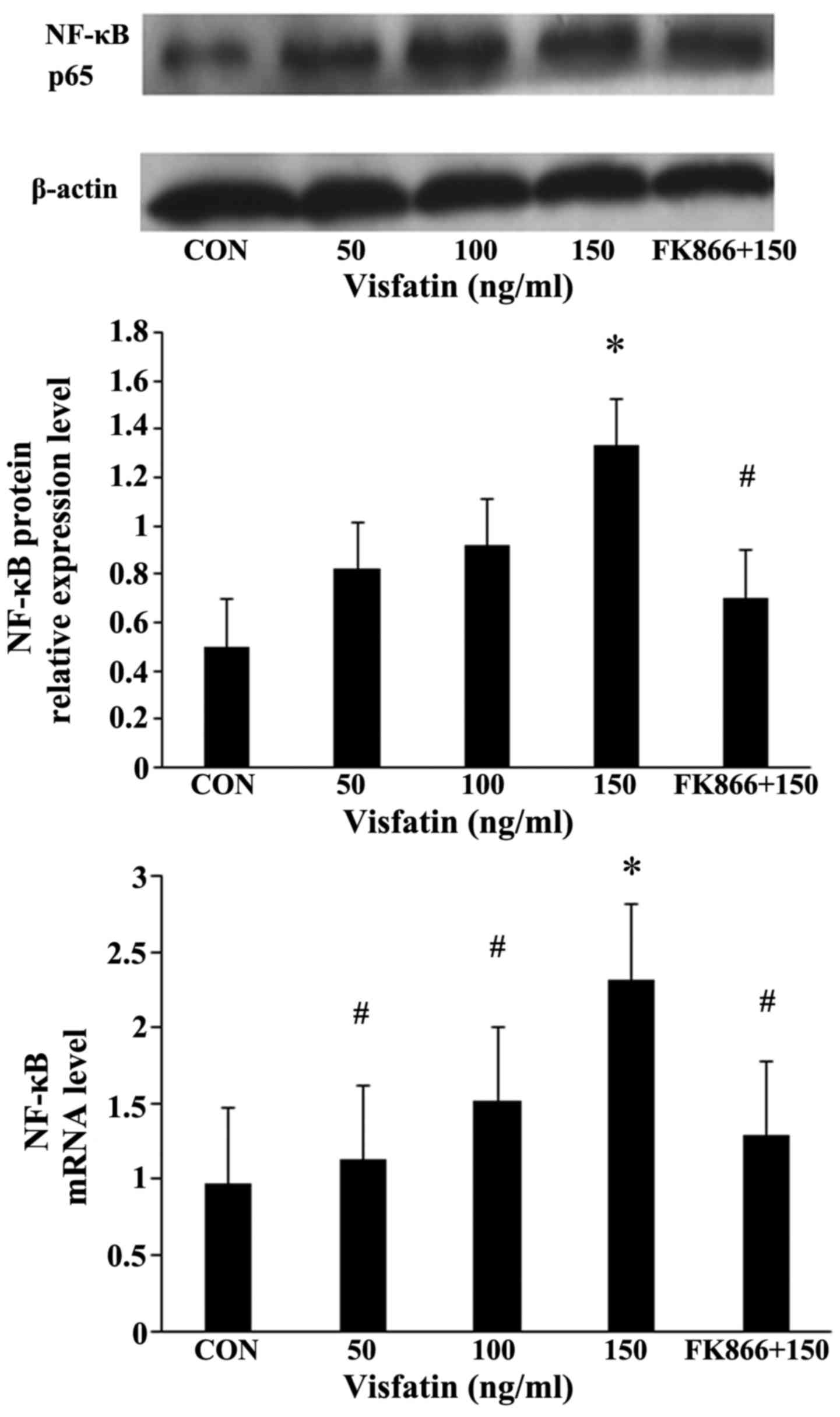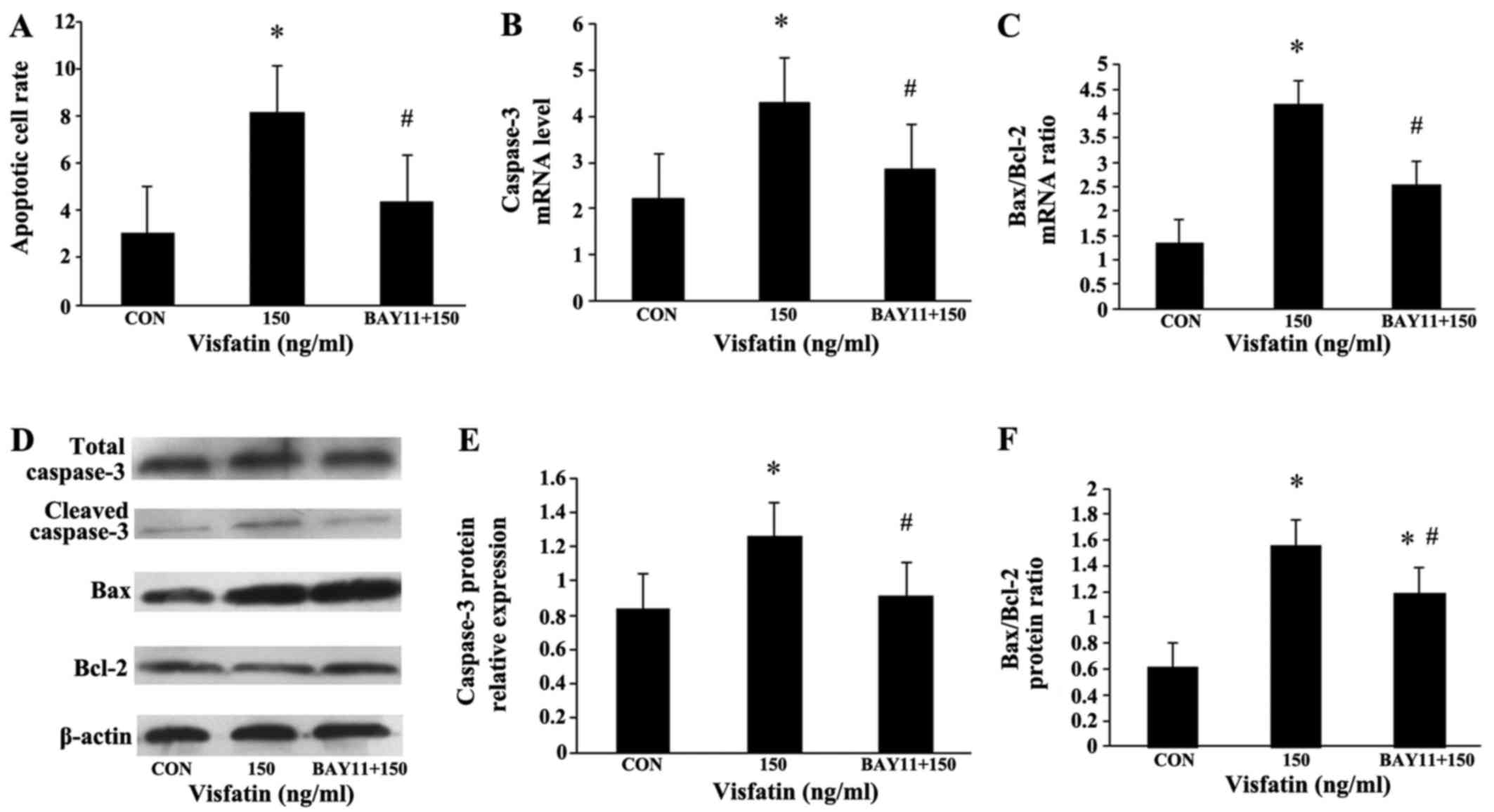|
1
|
Samal B, Sun Y, Stearns G, Xie C, Suggs S
and McNiece I: Cloning and characterization of the cDNA encoding a
novel human pre-B-cell colony-enhancing factor. Mol Cell Biol.
14:1431–1437. 1994. View Article : Google Scholar : PubMed/NCBI
|
|
2
|
Garten A, Petzold S, Schuster S, Körner A,
Kratzsch J and Kiess W: Nampt and its potential role in
inflammation and type 2 diabetes. Handb Exp Pharmacol. 203:147–164.
2011. View Article : Google Scholar
|
|
3
|
Kadoglou NP, Sailer N, Moumtzouoglou A,
Kapelouzou A, Tsanikidis H, Vitta I, Karkos C, Karayannacos PE,
Gerasimidis T and Liapis CD: Visfatin (nampt) and ghrelin as novel
markers of carotid atherosclerosis in patients with type 2
diabetes. Exp Clin Endocrinol Diabetes. 118:75–80. 2010. View Article : Google Scholar
|
|
4
|
Iacobellis G, Iorio M, Napoli N, Cotesta
D, Zinnamosca L, Marinelli C, Petramala L, Minisola S, D'Erasmo E
and Letizia C: Relation of adiponectin, visfatin and bone mineral
density in patients with metabolic syndrome. J Endocrinol Invest.
34:e12–e15. 2011. View Article : Google Scholar
|
|
5
|
Unlütürk U, Harmanci A, Yildiz BO and
Bayraktar M: Dynamics of Nampt/visfatin and high molecular weight
adiponectin in response to oral glucose load in obese and lean
women. Clin Endocrinol (Oxf). 72:469–474. 2010. View Article : Google Scholar
|
|
6
|
de Luis DA, Aller R, Gonzalez Sagrado M,
Conde R, Izaola O and de la Fuente B: Serum visfatin levels and
metabolic syndrome criteria in obese female subjects. Diabetes
Metab Res Rev. 29:576–581. 2013.PubMed/NCBI
|
|
7
|
Chen S, Sun L, Gao H, Ren L, Liu N and
Song G: Visfatin and oxidative stress influence endothelial
progenitor cells in obese populations. Endocr Res. 40:83–87. 2015.
View Article : Google Scholar
|
|
8
|
Boini KM, Zhang C, Xia M, Han WQ, Brimson
C, Poklis JL and Li PL: Visfatin-induced lipid raft redox signaling
platforms and dysfunction in glomerular endothelial cells. Biochim
Biophys Acta. 1801:1294–1304. 2010. View Article : Google Scholar : PubMed/NCBI
|
|
9
|
Xiao K, Zou WH, Yang Z, Rehman Zia ur,
Ansari AR, Yuan HR, Zhou Y, Cui L, Peng KM and Song H: The role of
visfatin on the regulation of inflammation and apoptosis in the
spleen of LPS-treated rats. Cell Tissue Res. 359:605–618. 2015.
View Article : Google Scholar
|
|
10
|
van der Veer E, Nong Z, O'Neil C, Urquhart
B, Freeman D and Pickering JG: Pre-B-cell colony-enhancing factor
regulates NAD+-dependent protein deacetylase activity
and promotes vascular smooth muscle cell maturation. Circ Res.
97:25–34. 2005. View Article : Google Scholar : PubMed/NCBI
|
|
11
|
Moschen AR, Kaser A, Enrich B, Mosheimer
B, Theurl M, Niederegger H and Tilg H: Visfatin, an adipocytokine
with proinflammatory and immunomodulating properties. J Immunol.
178:1748–1758. 2007. View Article : Google Scholar : PubMed/NCBI
|
|
12
|
Vallejo S, Romacho T, Angulo J, Villalobos
LA, Cercas E, Leivas A, Bermejo E, Carraro R, Sánchez-Ferrer CF and
Peiró C: Visfatin impairs endothelium-dependent relaxation in rat
and human mesenteric microvessels through nicotinamide
phosphoribosyltransferase activity. PLoS One. 6:e272992011.
View Article : Google Scholar : PubMed/NCBI
|
|
13
|
Urbich C and Dimmeler S: Endothelial
progenitor cells: Characterization and role in vascular biology.
Circ Res. 95:343–353. 2004. View Article : Google Scholar : PubMed/NCBI
|
|
14
|
Schmidt-Lucke C, Rössig L, Fichtlscherer
S, Vasa M, Britten M, Kämper U, Dimmeler S and Zeiher AM: Reduced
number of circulating endothelial progenitor cells predicts future
cardiovascular events: Proof of concept for the clinical importance
of endogenous vascular repair. Circulation. 111:2981–2987. 2005.
View Article : Google Scholar : PubMed/NCBI
|
|
15
|
Werner N, Kosiol S, Schiegl T, Ahlers P,
Walenta K, Link A, Böhm M and Nickenig G: Circulating endothelial
progenitor cells and cardiovascular outcomes. N Engl J Med.
353:999–1007. 2005. View Article : Google Scholar : PubMed/NCBI
|
|
16
|
Denny MF, Thacker S, Mehta H, Somers EC,
Dodick T, Barrat FJ, McCune WJ and Kaplan MJ: Interferon-alpha
promotes abnormal vasculogenesis in lupus: A potential pathway for
premature atherosclerosis. Blood. 110:2907–2915. 2007. View Article : Google Scholar : PubMed/NCBI
|
|
17
|
Fujii H, Li SH, Szmitko PE, Fedak PW and
Verma S: C-reactive protein alters antioxidant defenses and
promotes apoptosis in endothelial progenitor cells. Arterioscler
Thromb Vasc Biol. 26:2476–2482. 2006. View Article : Google Scholar : PubMed/NCBI
|
|
18
|
Tie G, Yan J, Yang Y, Park BD, Messina JA,
Raffai RL, Nowicki PT and Messina LM: Oxidized low-density
lipoprotein induces apoptosis in endothelial progenitor cells by
inactivating the phosphoinositide 3-kinase/Akt pathway. J Vasc Res.
47:519–530. 2010. View Article : Google Scholar : PubMed/NCBI
|
|
19
|
Sun Y, Chen S, Song G, Ren L, Wei L, Liu
N, Zhang D and Lv X: Effect of visfatin on the function of
endothelial progenitor cells in high-fat-fed obese rats and
investigation of its mechanism of action. Int J Mol Med.
30:622–628. 2012.PubMed/NCBI
|
|
20
|
Bakogiannis C, Tousoulis D, Androulakis E,
Briasoulis A, Papageorgiou N, Vogiatzi G, Kampoli AM, Charakida M,
Siasos G, Latsios G, et al: Circulating endothelial progenitor
cells as biomarkers for prediction of cardiovascular outcomes. Curr
Med Chem. 19:2597–2604. 2012. View Article : Google Scholar : PubMed/NCBI
|
|
21
|
Peng J, Liu B, Ma QL and Luo XJ:
Dysfunctional endothelial progenitor cells in cardiovascular
diseases: Role of NADPH oxidase. J Cardiovasc Pharmacol. 65:80–87.
2015. View Article : Google Scholar
|
|
22
|
Joseph B, Marchetti P, Formstecher P,
Kroemer G, Lewensohn R and Zhivotovsky B: Mitochondrial dysfunction
is an essential step for killing of non-small cell lung carcinomas
resistant to conventional treatment. Oncogene. 21:65–77. 2002.
View Article : Google Scholar : PubMed/NCBI
|
|
23
|
Ghobrial IM, Witzig TE and Adjei AA:
Targeting apoptosis pathways in cancer therapy. CA Cancer J Clin.
55:178–194. 2005. View Article : Google Scholar : PubMed/NCBI
|
|
24
|
Salvesen GS and Dixit VM: Caspases:
Intracellular signaling by proteolysis. Cell. 91:443–446. 1997.
View Article : Google Scholar : PubMed/NCBI
|
|
25
|
Korsmeyer SJ: BCL-2 gene family and the
regulation of programmed cell death. Cancer Res. 59(Suppl 7):
1693s–1700s. 1999.PubMed/NCBI
|
|
26
|
Youle RJ and Strasser A: The BCL-2 protein
family: Opposing activities that mediate cell death. Nat Rev Mol
Cell Biol. 9:47–59. 2008. View
Article : Google Scholar
|
|
27
|
Laudes M, Oberhauser F, Schulte DM, Freude
S, Bilkovski R, Mauer J, Rappl G, Abken H, Hahn M, Schulz O, et al:
Visfatin/PBEF/Nampt and resistin expressions in circulating blood
monocytes are differentially related to obesity and type 2 diabetes
in humans. Horm Metab Res. 42:268–273. 2010. View Article : Google Scholar : PubMed/NCBI
|
|
28
|
Zhang Y, Ingram DA, Murphy MP, Saadatzadeh
MR, Mead LE, Prater DN and Rehman J: Release of proinflammatory
mediators and expression of proinflammatory adhesion molecules by
endothelial progenitor cells. Am J Physiol Heart Circ Physiol.
296:H1675–H1682. 2009. View Article : Google Scholar : PubMed/NCBI
|
|
29
|
Adamis AP and Berman AJ: Immunological
mechanisms in the pathogenesis of diabetic retinopathy. Semin
Immunopathol. 30:65–84. 2008. View Article : Google Scholar : PubMed/NCBI
|
|
30
|
Satofuka S, Ichihara A, Nagai N, Yamashiro
K, Koto T, Shinoda H, Noda K, Ozawa Y, Inoue M, Tsubota K, et al:
Suppression of ocular inflammation in endotoxin-induced uveitis by
inhibiting nonproteolytic activation of prorenin. Invest Ophthalmol
Vis Sci. 47:2686–2692. 2006. View Article : Google Scholar : PubMed/NCBI
|
|
31
|
Murugeswari P, Shukla D, Rajendran A, Kim
R, Namperumalsamy P and Muthukkaruppan V: Proinflammatory cytokines
and angiogenic and anti-angiogenic factors in vitreous of patients
with proliferative diabetic retinopathy and eales' disease. Retina.
28:817–824. 2008. View Article : Google Scholar : PubMed/NCBI
|
|
32
|
Tang JN, Shen DL, Liu CL, Wang XF, Zhang
L, Xuan XX, Cui LL and Zhang JY: Plasma levels of C1q/TNF-related
protein 1 and interleukin 6 in patients with acute coronary
syndrome or stable angina pectoris. Am J Med Sci. 349:130–136.
2015. View Article : Google Scholar : PubMed/NCBI
|
|
33
|
Kitaba S, Murota H, Terao M, Azukizawa H,
Terabe F, Shima Y, Fujimoto M, Tanaka T, Naka T, Kishimoto T, et
al: Blockade of interleukin-6 receptor alleviates disease in mouse
model of scleroderma. Am J Pathol. 180:165–176. 2012. View Article : Google Scholar
|
|
34
|
Okiyama N, Sugihara T, Iwakura Y, Yokozeki
H, Miyasaka N and Kohsaka H: Therapeutic effects of interleukin-6
blockade in a murine model of polymyositis that does not require
interleukin-17A. Arthritis Rheum. 60:2505–2512. 2009. View Article : Google Scholar : PubMed/NCBI
|
|
35
|
Kitagawa K, Matsumoto M, Sasaki T,
Hashimoto H, Kuwabara K, Ohtsuki T and Hori M: Involvement of
ICAM-1 in the progression of atherosclerosis in APOE-knockout mice.
Atherosclerosis. 160:305–310. 2002. View Article : Google Scholar : PubMed/NCBI
|
|
36
|
Bielinski SJ, Pankow JS, Li N, Hsu FC,
Adar SD, Jenny NS, Bowden DW, Wasserman BA and Arnett D: ICAM1 and
VCAM1 polymorphisms, coronary artery calcium, and circulating
levels of soluble ICAM-1: the multi-ethnic study of atherosclerosis
(MESA). Atherosclerosis. 201:339–344. 2008. View Article : Google Scholar : PubMed/NCBI
|
|
37
|
Tanaka T, Narazaki M and Kishimoto T: IL-6
in inflammation, immunity, and disease. Cold Spring Harb Perspect
Biol. 6:a0162952014. View Article : Google Scholar : PubMed/NCBI
|
|
38
|
Kim SR, Bae YH, Bae SK, Choi KS, Yoon KH,
Koo TH, Jang HO, Yun I, Kim KW, Kwon YG, et al: Visfatin enhances
ICAM-1 and VCAM-1 expression through ROS-dependent NF-kappaB
activation in endothelial cells. Biochim Biophys Acta.
1783:886–895. 2008. View Article : Google Scholar : PubMed/NCBI
|
|
39
|
Wan R, Liu Y, Li L, Zhu C, Jin L and Li S:
Urocortin increased endothelial ICAM1 by cPLA2-dependent NF-kappaB
and PKA pathways in HUVECs. J Mol Endocrinol. 52:43–53. 2013.
View Article : Google Scholar
|
|
40
|
Matsuda A, Yang WL, Jacob A, Aziz M,
Matsuo S, Matsutani T, Uchida E and Wang P: FK866, a visfatin
inhibitor, protects against acute lung injury after intestinal
ischemia-reperfusion in mice via NF-κB pathway. Ann Surg.
259:1007–1017. 2014. View Article : Google Scholar
|
|
41
|
Patel ST, Mistry T, Brown JE, Digby JE,
Adya R, Desai KM and Randeva HS: A novel role for the adipokine
visfatin/pre-B cell colony-enhancing factor 1 in prostate
carcinogenesis. Peptides. 31:51–57. 2010. View Article : Google Scholar
|
|
42
|
Yang H, Yang T, Baur JA, Perez E, Matsui
T, Carmona JJ, Lamming DW, Souza-Pinto NC, Bohr VA, Rosenzweig A,
et al: Nutrient-sensitive mitochondrial NAD+ levels
dictate cell survival. Cell. 130:1095–1107. 2007. View Article : Google Scholar : PubMed/NCBI
|
|
43
|
Hasmann M and Schemainda I: FK866, a
highly specific noncompetitive inhibitor of nicotinamide
phosphoribosyltransferase, represents a novel mechanism for
induction of tumor cell apoptosis. Cancer Res. 63:7436–7442.
2003.PubMed/NCBI
|
|
44
|
Wosikowski K, Mattern K, Schemainda I,
Hasmann M, Rattel B and Löser R: WK175, a novel antitumor agent,
decreases the intracellular nicotinamide adenine dinucleotide
concentration and induces the apoptotic cascade in human leukemia
cells. Cancer Res. 62:1057–1062. 2002.PubMed/NCBI
|
|
45
|
Crabtree HG: Observations on the
carbohydrate metabolism of tumours. Biochem J. 23:536–545. 1929.
View Article : Google Scholar : PubMed/NCBI
|
|
46
|
Kroemer G and Pouyssegur J: Tumor cell
metabolism: Cancer's Achilles' heel. Cancer Cell. 13:472–482. 2008.
View Article : Google Scholar : PubMed/NCBI
|
|
47
|
Tan BK, Chen J, Digby JE, Keay SD, Kennedy
CR and Randeva HS: Increased visfatin messenger ribonucleic acid
and protein levels in adipose tissue and adipocytes in women with
polycystic ovary syndrome: Parallel increase in plasma visfatin. J
Clin Endocrinol Metab. 91:5022–5028. 2006. View Article : Google Scholar : PubMed/NCBI
|
|
48
|
Kocelak P, Olszanecka-Glinianowicz M,
Owczarek A, Bożentowicz-Wikarek M, Brzozowska A, Mossakowska M,
Zdrojewski T, Grodzicki T, Więcek A and Chudek J: Plasma
visfatin/nicotinamide phosphoribosyltransferase levels in
hypertensive elderly - results from the PolSenior substudy. J Am
Soc Hypertens. 9:1–8. 2015. View Article : Google Scholar
|
|
49
|
Rongvaux A, Galli M, Denanglaire S, Van
Gool F, Drèze PL, Szpirer C, Bureau F, Andris F and Leo O:
Nicotinamide phosphoribosyl transferase/pre-B cell colony-enhancing
factor/visfatin is required for lymphocyte development and cellular
resistance to genotoxic stress. J Immunol. 4685–4695. 2008.
View Article : Google Scholar : PubMed/NCBI
|
|
50
|
Borradaile NM and Pickering JG:
Nicotinamide phosphoribosyltransferase imparts human endothelial
cells with extended replicative lifespan and enhanced angiogenic
capacity in a high glucose environment. Aging Cell. 8:100–112.
2009. View Article : Google Scholar : PubMed/NCBI
|
|
51
|
Adya R, Tan BK, Punn A, Chen J and Randeva
HS: Visfatin induces human endothelial VEGF and MMP-2/9 production
via MAPK and I3K/Akt signalling pathways: Novel insights into
visfatin-induced angiogenesis. Cardiovasc Res. 78:356–365. 2008.
View Article : Google Scholar
|















